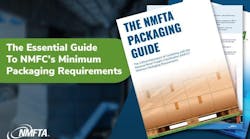Trying to get a handle on the shady world of fraudulent brokers and freight forwarders, two U.S. Congressmen have introduced a bill designed to help the industry fight back.
With the backing of three powerful trucking lobbies, the “Fighting Fraud in Transportation Act 2011, FITT, (H.R. 2357),” introduced last week by Reps. Russ Carnahan (D-MO) and Frank Guinta (R-NH), would increase bond amounts and strengthen requirements before anyone can begin brokering freight.
“This law would put a stop to a system that allows ruthless brokers and scam artists to continue to operate unchecked,” said Todd Spencer, executive vp of the Owner-Operator Independent Drivers Assn. (OOIDA), one of the bill’s supporters. “Too often, we’ve seen deceitful brokers get away with collecting payments from shippers but cheating truckers out of what is rightfully theirs.”
The Transportation Intermediaries Assn. (TIA) and American Trucking Assns. (ATA) also support the bill, which would help put an end to “unscrupulous operators that victimized both brokers and carriers,” according to TIA.
“The legislation recognizes that the brokerage and overall transportation industry have changed since the ICC Termination Act,” said TIA president & CEO Robert Voltmann. “The FFIT Act will address serious fraud and confusion in the industry. It is supported by the leading transportation associations in Washington, representing companies of all sizes, who are united in our belief that this will, insure that providers are properly capitalized and can meet their financial obligations.”
The bill, H.R. 2357 (dubbed the Fighting Fraud in Transportation Act 2011: FITT), would require brokers and freight forwarders to carry a $100,000 bond as compared to the current requirement of $10,000. It would also crack down on transparency for those seeking to become brokers and establish “significant” penalties including unlimited liability for freight charges for those operating without authority.
“In many instances, brokers provide a valuable service to truckers and the transportation industry. However, the current system is loose enough that it provides ample, fertile ground for fraud. This has gone on far too long. It needs to stop,” Spencer also said.
Carriers would be required to hold broker or freight forwarder authority. The bill would also “clarify that a motor carrier may provide transportation of property with self-propelled motor vehicles owned or leased by the motor carrier or through interchanges as permitted under regulation issued by the secretary, provided that the originating carrier must physically transport the cargo at some point, and retains liability for the cargo and payment of interchanged carriers and require that there must be at least one corporate officer who has met minimum training standards or equivalent experience.”
“Brokers, forwarders, owner-operators, and carriers need each other, and the speed of today’s logistics marketplace means that companies must be able to reasonably rely on representations made in the terms of their agreement,” Voltmann added. “Unfortunately, the seeping encroachment of fraudulent operations has left the legitimate industry vulnerable.”


